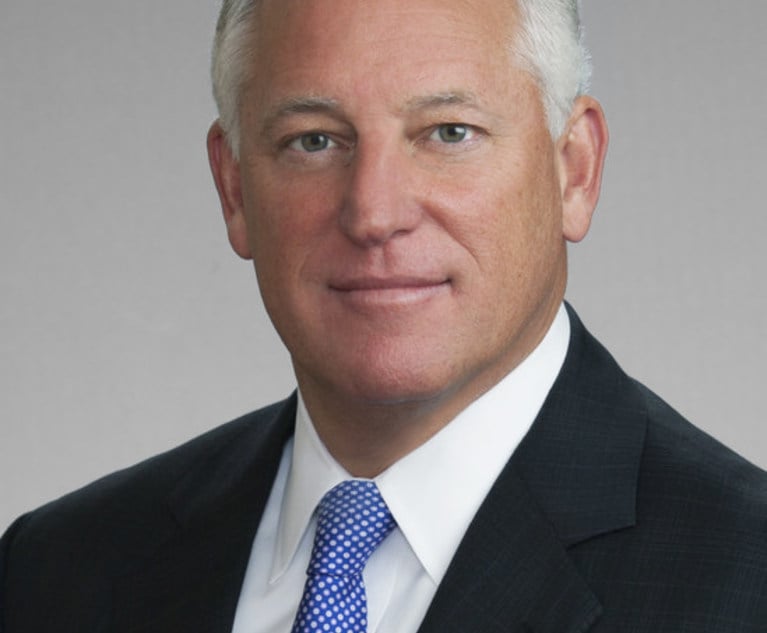2 Florida Law Schools Among 10 Sanctioned by ABA for Lax Admissions
Two private law schools in Florida have been disciplined in little more than a year for enrolling students who the American Bar Association believes are unlikely to graduate and pass the bar.
November 21, 2017 at 04:21 PM
5 minute read
The original version of this story was published on Law.com
Two Florida law schools are among 10 disciplined by the American Bar Association since August 2016 for enrolling students who it says are unlikely to graduate and pass the bar — an unprecedented crackdown since such actions historically are rare.
The sanctions issued by the ABA's Council of the Section of Legal Education and Admissions to the Bar range from letters of noncompliance setting out remedial plans to censure to probation.
Based on a search of the public notices posted on its website, the ABA has found that the campuses failed to comply with some or all of the accreditation requirements that schools: “maintain sound admissions policies;” “maintain a rigorous program of legal education that prepares its students, upon graduation, for admission to the bar and for effective, ethical, and responsible participation as members of the legal profession;” “provide academic support designed to afford students a reasonable opportunity to complete the program of legal education, graduate and become members of the legal profession;” and not “admit an applicant who does not appear capable of satisfactorily completing its program of legal education and being admitted to the bar.”
The schools are: Appalachian School of Law in Grundy, Virginia, Arizona Summit Law School in Phoenix, Ave Maria School of Law in Naples, Florida, Charlotte Law School (now closed), Cooley Law School in Lansing, Michigan, Florida Coastal School of Law in Jacksonville, Atlanta's John Marshall Law School, Thomas Jefferson School of Law in San Diego, Thurgood Marshall School of Law at Texas Southern University in Houston and Valparaiso University Law School in Valparaiso, Indiana. Some schools have since been found to be in compliance, in whole or in part, and had the sanction removed.
Nearly half of these are controversial for-profit institutions: Arizona Summit, Charlotte, Florida Coastal and John Marshall have been scrutinized for enrolling students who incur large amounts of student debt while failing to pass the bar and secure gainful employment in the legal profession.
A law school remains accredited by the ABA throughout this disciplinary process, said Barry Currier, the ABA's managing director of accreditation and legal education. Depending on the type of discipline imposed, the schools have various opportunities to come into compliance with the rules, he said. The ABA examined the schools' Law School Admission Test scores and undergraduate grades of admitted students, bar passage rates and academic support programs when reaching its conclusions.
Currier attributed the disciplinary actions to widespread changes in legal education over the past seven or so years, namely the national decline in applicants. If schools were already challenged in meeting the ABA's admissions standards in 2010, then they are even more so today in light of the declining number and quality of applicants, he said.
“It is logical to ask these schools to demonstrate that the students who are coming into their programs have a reasonable likelihood of success with academics and on the licensing or bar exam, and that the schools have programs to maximize the students' likelihood of success,” Currier said in an email message.
“Given our current processes, some of the matters that have recently come to a head actually began some time ago as a result of changing market forces.”
Scott DeVito, dean of Florida Coastal, which last month received a letter of noncompliance, said the school has greatly increased its incoming credentials and is continuing to do so in the upcoming year, leaving DeVito, he wrote in an email, to “believe that Florida Coastal is currently fully compliant with” the standard governing admissions. In addition, DeVito noted the school is compliant with the ABA's bar passage rate standard even though its pass rate on last summer's Florida exam was 47.7 percent, according to the state's Board of Bar Examiners.
ALM reached out to the deans of the law schools, with the exceptions of Valparaiso, which earlier this month had its sanction of public censure removed, and Charlotte, which has since closed. Four of the deans, including DeVito, provided comments.
Kevin Cieply, president and dean of Ave Maria, said in an email that the council in March found the school in compliance with one of the admissions standards, and he last week submitted a report to the ABA outlining its case that it is now in compliance with the other standard it was found to have violated.
Joan Bullock, dean of Thomas Jefferson, which last week was notified that the council voted earlier this month to place it on probation, said in a statement that the school has a “strong track record of producing successful graduates,” noting its more than 7,000 national and international alumni who currently practice law in a variety of settings.
“They are excellent contributors to the legal community and provide much-needed service to the community at large,” Bullock said. “While we are disappointed with the council's decision, we are addressing the ABA's concerns.”
Don Lively, dean of Arizona Summit, which was placed on probation in March, acknowledged that while the school's recent bar passage rate has been “weak,” it has taken necessary steps to improve it.
“It also is worth noting that three out of every four students at our school eventually have passed a bar examination (and at times we have led a state that has two first-tier law schools) — despite having a significantly lower LSAT profile,” Lively wrote in an e-mail.
This content has been archived. It is available through our partners, LexisNexis® and Bloomberg Law.
To view this content, please continue to their sites.
Not a Lexis Subscriber?
Subscribe Now
Not a Bloomberg Law Subscriber?
Subscribe Now
NOT FOR REPRINT
© 2024 ALM Global, LLC, All Rights Reserved. Request academic re-use from www.copyright.com. All other uses, submit a request to [email protected]. For more information visit Asset & Logo Licensing.
You Might Like
View All
More Big Law Firms Rush to Match Associate Bonuses, While Some Offer Potential for Even More

Dog Gone It, Target: Provider of Retailer's Mascot Dog Sues Over Contract Cancellation
4 minute read
In Talc Bankruptcy, Andy Birchfield Skipped His Deposition. Could He Face Sanctions?
6 minute read
GC Conference Takeaways: Picking AI Vendors 'a Bit of a Crap Shoot,' Beware of Internal Investigation 'Scope Creep'
8 minute readTrending Stories
- 1Waterbury Jury Awards $2 Million Verdict Against Eversource
- 2Walter Taggart, Villanova Law Professor, Dies at 81
- 3$2.7M Verdict for Whistleblower Exposes Employer to $300M Claim
- 4Phila. Med Mal Lawyers In for Busy Year as Court Adjusts for Filing Boom
- 5Bonus Parade Continues, With Additional Firms Matching Milbank
Who Got The Work
Michael G. Bongiorno, Andrew Scott Dulberg and Elizabeth E. Driscoll from Wilmer Cutler Pickering Hale and Dorr have stepped in to represent Symbotic Inc., an A.I.-enabled technology platform that focuses on increasing supply chain efficiency, and other defendants in a pending shareholder derivative lawsuit. The case, filed Oct. 2 in Massachusetts District Court by the Brown Law Firm on behalf of Stephen Austen, accuses certain officers and directors of misleading investors in regard to Symbotic's potential for margin growth by failing to disclose that the company was not equipped to timely deploy its systems or manage expenses through project delays. The case, assigned to U.S. District Judge Nathaniel M. Gorton, is 1:24-cv-12522, Austen v. Cohen et al.
Who Got The Work
Edmund Polubinski and Marie Killmond of Davis Polk & Wardwell have entered appearances for data platform software development company MongoDB and other defendants in a pending shareholder derivative lawsuit. The action, filed Oct. 7 in New York Southern District Court by the Brown Law Firm, accuses the company's directors and/or officers of falsely expressing confidence in the company’s restructuring of its sales incentive plan and downplaying the severity of decreases in its upfront commitments. The case is 1:24-cv-07594, Roy v. Ittycheria et al.
Who Got The Work
Amy O. Bruchs and Kurt F. Ellison of Michael Best & Friedrich have entered appearances for Epic Systems Corp. in a pending employment discrimination lawsuit. The suit was filed Sept. 7 in Wisconsin Western District Court by Levine Eisberner LLC and Siri & Glimstad on behalf of a project manager who claims that he was wrongfully terminated after applying for a religious exemption to the defendant's COVID-19 vaccine mandate. The case, assigned to U.S. Magistrate Judge Anita Marie Boor, is 3:24-cv-00630, Secker, Nathan v. Epic Systems Corporation.
Who Got The Work
David X. Sullivan, Thomas J. Finn and Gregory A. Hall from McCarter & English have entered appearances for Sunrun Installation Services in a pending civil rights lawsuit. The complaint was filed Sept. 4 in Connecticut District Court by attorney Robert M. Berke on behalf of former employee George Edward Steins, who was arrested and charged with employing an unregistered home improvement salesperson. The complaint alleges that had Sunrun informed the Connecticut Department of Consumer Protection that the plaintiff's employment had ended in 2017 and that he no longer held Sunrun's home improvement contractor license, he would not have been hit with charges, which were dismissed in May 2024. The case, assigned to U.S. District Judge Jeffrey A. Meyer, is 3:24-cv-01423, Steins v. Sunrun, Inc. et al.
Who Got The Work
Greenberg Traurig shareholder Joshua L. Raskin has entered an appearance for boohoo.com UK Ltd. in a pending patent infringement lawsuit. The suit, filed Sept. 3 in Texas Eastern District Court by Rozier Hardt McDonough on behalf of Alto Dynamics, asserts five patents related to an online shopping platform. The case, assigned to U.S. District Judge Rodney Gilstrap, is 2:24-cv-00719, Alto Dynamics, LLC v. boohoo.com UK Limited.
Featured Firms
Law Offices of Gary Martin Hays & Associates, P.C.
(470) 294-1674
Law Offices of Mark E. Salomone
(857) 444-6468
Smith & Hassler
(713) 739-1250









